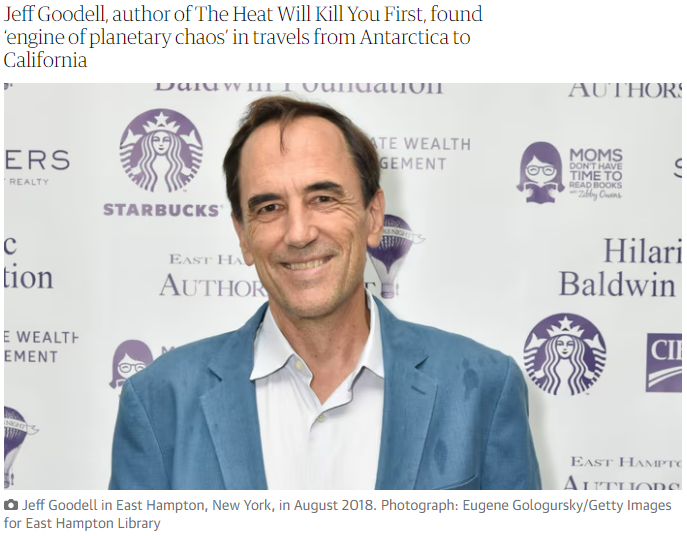Racism at heart of US failure to tackle deadly heatwaves, expert warns
By Nina Lakhani, Climate justice reporter
August 6, 2023
 Racism is at the heart of the American government’s failure to tackle the growing threat of deadly heatwaves, according to the author of an authoritative new book on the heating planet.
Racism is at the heart of the American government’s failure to tackle the growing threat of deadly heatwaves, according to the author of an authoritative new book on the heating planet.
Jeff Goodell, an award winning climate journalist, told the Guardian that people of color – including millions of migrant workers who are bearing the brunt of record-breaking temperatures as farmhands, builders and delivery workers – are not guaranteed lifesaving measures like water and shade breaks because they are considered expendable.
In The Heat Will Kill You First: Life and Death on a Scorched Planet, Goodell documents the tragic – and preventable – death of Sebastian Perez, a Guatemalan garden centre worker who collapsed and died in Portland, Oregon, on the first day of the brutal Pacific north-west heatwave in June 2021. In the US, there are no federal rules related to heat exposure for workers – indoors or out.
“To be blunt about it, the people most impacted by heat are not the kind of voting demographic that gets any politician nervous. They’re unsheltered people, poor people, agricultural and construction workers. People like Sebastian Perez are just seen as expendable. They’re not seen as humans who need to be protected. Racism is absolutely central to the government’s failure to protect vulnerable people.”
A construction worker takes a sip of water while repairing a road that was damaged from the heat in Houston, Texas.
‘The cruelty Olympics’: Texas workers condemn elimination of water breaks
Read more
A couple of states have implemented heat exposure rules, yet last month in the middle of a heatwave, Texas governor Greg Abbott signed legislation prohibiting any city or county in the state from passing laws requiring shade and water breaks for outdoor workers. The vast majority of farmhands and construction workers in Texas are migrants from Mexico and Central America. “I mean, that is insane, and emblematic of the ‘cruelty is the point’ ideology in so much of our politics right now.”
According to Goodell, the risks faced by mostly Black and brown workers also reveal enduring elements of scientific racism previously used to justify forcing enslaved African people to do backbreaking farm work in the scorching south. “There were all kinds of crazy racist ideas like African people having thicker bones in their skulls that insulated them from heat. While nobody talks about that explicitly now, it is absolutely an undercurrent that having Mexicans pave roads in Austin in 107F [42C] is fine because they’re from Mexico, and used to it.
“It’s not just about these vulnerable people who can’t vote or the incompetence of the government, it is out and out racism.”
Goodell’s book is a comprehensive, compelling and timely examination of the fossil fuel-driven extreme heat that is transforming the planet and its inhabitants. Heat – in the atmosphere and the oceans – is driving every single climate impact, from rising sea level and melting glaciers to intensifying droughts, wildfires and superstorms. Heat is the “engine of planetary chaos” yet its dangers remain poorly understood.
Goodell’s reporting extends from Antarctica, California and the Arctic, to Paris, Chennai and the Great Barrier Reef, weaving stories of farmworkers, hikers, urbanites and polar bears with scientific analysis and political critique, and so connecting the dots between heat-related personal tragedies and the risks of global heating on the planetary scale.
His overarching goal was to make heat visible and make it feel urgent, which shouldn’t be that hard given that tens of thousands of people are already dying from extreme heat every year. July was the hottest month ever recorded on the planet and at least two-thirds of Americans were under some sort of heat advisory.
Yet currently the Federal Emergency Management Agency (Fema) cannot declare or respond to extreme heat as a disaster like it can for a severe storm or tornado. And the messaging and warnings around heat are confused, with local weather service offices left to issue alerts or advisories as they see fit.
[READ FULL ARTICLE HERE]
